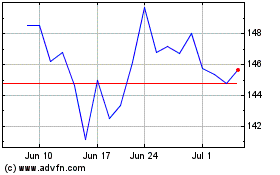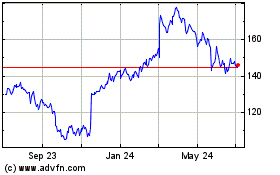By Khadeeja Safdar and Sarah Nassauer
This article is being republished as part of our daily
reproduction of WSJ.com articles that also appeared in the U.S.
print edition of The Wall Street Journal (November 23, 2019).
Target Corp. CEO Brian Cornell knows how brutal it can be to run
a bricks-and-mortar chain in the online age.
Since taking the helm in 2014, the 60-year-old Mr. Cornell has
led the retailer through the aftermath of a massive data breach, an
exit from Canada, and a customer backlash to a policy allowing
transgender shoppers to use whichever restroom corresponds with
their gender identity.
But one of his most daunting days came in 2017, when Mr. Cornell
outlined a comeback plan for Target's floundering U.S. business.
Standing before analysts in New York, he said Target would spend
billions of dollars to improve its stores, launch exclusive brands
and cut prices.
Hours earlier, Target had reported a decline in holiday sales
after losing market share to Amazon.com Inc. and Walmart Inc.
Target's stock plunged 12% in response to the decline -- and his
turnaround plan -- its biggest one-day drop since 2008.
"It's unclear if there is a winning strategy at this point,"
Credit Suisse analysts wrote in an investor note that day. "It was
hard to climb those stairs and stand in front of that audience
looking at me wondering why we made this decision," Mr. Cornell
recalls.
Target has since posted several quarters of sales gains,
including reporting a 4.5% increase this week in comparable sales
for the quarter ended Nov. 2. The latest results beat Wall Street's
forecasts and prompted the company to raise its fiscal-year profit
forecast. Shares closed at an all-time high of $127.65 on Thursday,
nearly doubling since the start of the year.
Mr. Cornell, who coached high-school football while he was a
student at UCLA, was an executive at PepsiCo Inc. and Sam's Club
before becoming CEO of Target. He recently spoke with The Wall
Street Journal in New York about steering Target through the
turmoil. Here are edited excerpts:
WSJ: What made you want to be a retail CEO?
Brian Cornell: I grew up a very poor kid right here in Queens,
without a dad, with a mom who was disabled. I've shoveled a lot of
snow and mowed a lot of grass and had lots of different odd
jobs.
My junior year at UCLA, the head [football] coach asked me,
"Brian, what are you going to do after you graduate?" I told him I
was thinking about becoming a teacher and a football coach. He
started asking me these odd questions: "Can you paint? How do you
feel about laying carpet on weekends?" He said, "Brian, for most of
us coaching at the high school level, we had to find extra jobs
during the summer, on weekends just make ends meet."
That was an inflection point. Having struggled economically most
of my life, I said, "Maybe I'll try something different." And no
regrets. I still get to coach and develop talent.
WSJ: What do you wish you had known before taking over at
Target?
Mr. Cornell: When I came in, we were recovering from the data
breach. We had a challenging entry into Canada. I thought those
were the two biggest challenges I was going to face. I quickly
discovered the real challenge was in the U.S., where we were losing
market share, and [store] traffic was declining.
WSJ: How did you come up with the comeback plan?
Mr. Cornell: We did most of the work ourselves. We spent a lot
of time with the consumer, inside of consumers' homes, talking to
our guests, talking to our team.
Most of the coverage retail was getting was all about everything
shifting online. Physical retail was going to go away. As we talked
to the consumer, we kept hearing a different response, that the
consumer still enjoyed physical stores, but their expectations were
different. They wanted a great in-store experience. They wanted
inspiration and ease. They wanted great customer service.
WSJ: How do you think about succession planning?
Mr. Cornell: Though I'm in year six, I still feel like we're in
the early days of making sure we're on the right path. I've a lot
of work left to do. I haven't thought about what's next and when
it's the right time. I'm sure someone will tap me on the shoulder
and let me know when it's my time to step aside.
WSJ: What advice would you give another leader of a
bricks-and-mortar retailer today?
Mr. Cornell: You've got to continue to be a great student of the
consumer. You have to be willing to and have the courage to
reinvent your business, to constantly invest in those new
initiatives.
WSJ: What keeps you up at night?
Mr. Cornell: Well, I don't sleep much because I've got a lot on
my mind and we still have a lot left to do. If there's anything I
worry about, it's becoming complacent, feeling as if we have
arrived and we are winning. Retail will always be a very, very
competitive marketplace.
WSJ: How do you make sure you understand your competitors?
Mr. Cornell: We spend a lot of time in the market, walking in
competitors' stores, trying to understand their strategies, reading
their [investor call] transcripts.
WSJ: Walmart or Amazon -- who do you worry about more?
Mr. Cornell: I worry about both of them, and I will forever.
They'll always be two really significant competitors and
competitors we can never underestimate.
Write to Khadeeja Safdar at khadeeja.safdar@wsj.com and Sarah
Nassauer at sarah.nassauer@wsj.com
(END) Dow Jones Newswires
November 23, 2019 02:47 ET (07:47 GMT)
Copyright (c) 2019 Dow Jones & Company, Inc.
Target (NYSE:TGT)
Historical Stock Chart
From Mar 2024 to Apr 2024

Target (NYSE:TGT)
Historical Stock Chart
From Apr 2023 to Apr 2024
